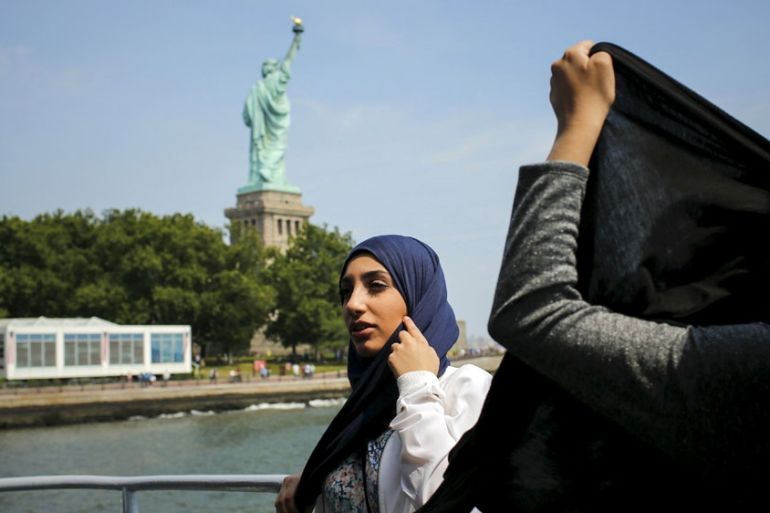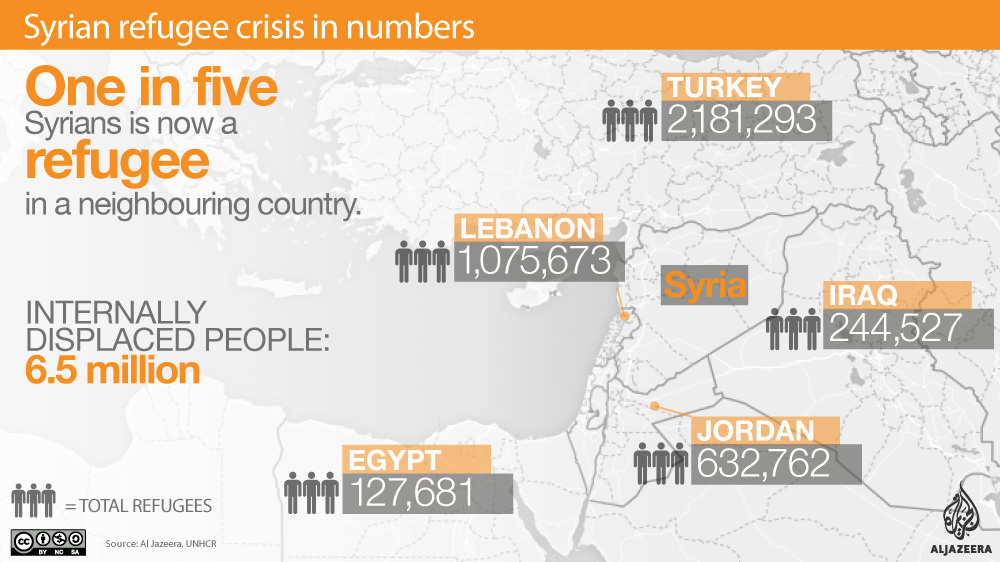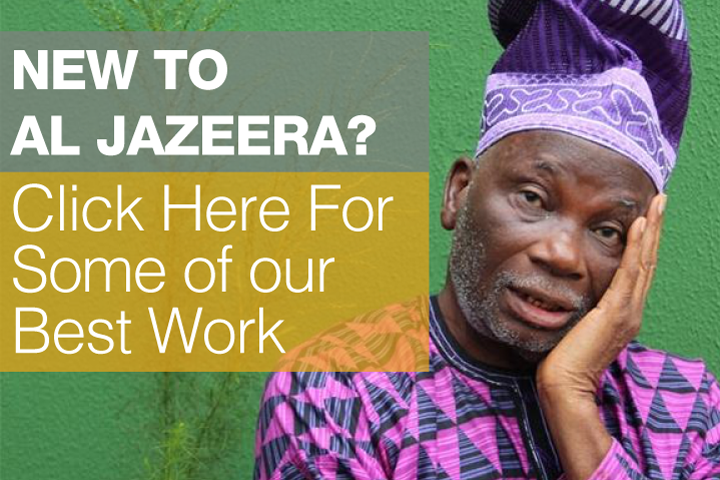Much ado about Muslim refugees
As politicians clash over accepting displaced Syrians, many fear the focus is shifting from the causes of the crisis.

Doha, Qatar – As tens of thousands of people try to flee conflict and strife in large expanses of Asia and Africa each month, one question unblinkingly stares policymakers and the global commentariat in the face: Should the US, Europe and wealthy Arab Gulf states open the door to increased immigration from Syria and other war-scarred Muslim-majority countries?
Up until October, the case for taking in more refugees and asylum seekers from embattled states as far apart as Libya and Afghanistan seemed like an open-and-shut one, at least from the standpoint of those on the left of the political spectrum.
But from November, the same question – posed against a backdrop of bloody attacks by ISIL or al-Qaeda-linked groups in Beirut, Paris and Bamako – has taken on a life of its own, filling newspaper oped pages and social media sites with moral outrage in response to the daily dose of Republican campaign bombast and the rhetoric of European far-right populism.

The December 2 assault by Syed Rizwan Farook and Tashfeen Malik, which killed 14 people and wounded 21 more in San Bernardino, California, has added another dimension to the debate.
Already, following the November 13 Paris attacks that claimed at least 130 lives and left hundreds more injured, most US Republican state governors have said they will not accept refugees from Syria even though they have little power to interfere with federal resettlement programmes.
And then there’s Donald Trump, the Republican presidential candidate who has converted the resettlement plan practically into the central plank of his campaign, peppering his speeches with tirades that insult not only Syrian refugees but Muslim Americans in general.
REPORTER’S NOTEBOOK: Is Donald Trump ever going to go ‘too far’?
What strange twist of fate could have made so many Western politicians direct their fire primarily at destitute Middle Eastern families, yet leave the regimes and armed groups responsible for the forced displacement to their own devices?
The irony is unmistakable when one considers the little-known fact that the Statue of Liberty in New York, the symbol of democracy and freedom that has greeted tens of millions of immigrants to the US since 1886, was inspired – according to researchers for the US National Park Service – by a project representing an Arab peasant woman guarding the Suez Canal in Egypt.
Symbolism aside, many analysts say the public discourse on issues of displacement and resettlement is being framed by Western politicians and media mavens along all-too-predictable left-right lines, generating an abundance of soundbites but obscuring the complex challenges confronting their governments.
![The Statue of Liberty, which has greeted immigrants to US since 1886, was inspired by a project representing an Arab woman [EPA]](/wp-content/uploads/2015/12/5dd557247aa6484e836331faf764fbc7_18.jpeg)
Indeed, the heated debate on the subject of intake of refugees by the West and Arab Gulf states is regarded by some Syria analysts as not only an exercise in misdirected finger-pointing but also as a frustrating distraction from what is at issue.
“We are forgetting the causes of the conflict and focusing on the effects and outcomes,” Marwan Kabalan, a Syria expert for the Arab Centre for Research and Policy Studies of the Doha Institute for Graduate Studies, told Al Jazeera.
“Assad is exporting his problem by forcing more people to leave the country and creating a problem for other countries to deal with, countries that should be treating him as the main problem.
“The international community should stop the conflict in the first place, or at least tackle the refugee issue and the war as two parallel processes. If they just see it as a refugee crisis and more refugees keep pouring out because of the conflict, the problem will not get solved.”

Analysts like Kabalan say the Syrian war is no longer a fight for political rights and dignity, or even the revolution of the early months of 2011.
Their argument goes something like this: This is an international conflict that is taking place on Syrian soil and with Syrian blood. The party that is paying the heaviest price is the Syrian people. Instead of treating the problem as a humanitarian crisis, why don’t the world’s major powers seek to tackle it at its root?
There is also a sense that politicians and pundits in the US and EU are engaged in excessive navel-gazing, splitting hairs over whether their own governments and the Arab Gulf states are being too selfish or too generous, possibly because contribution in humanitarian fields from the other side in the Syrian conflict has been way short of expectations.
Abdulkhaleq Abdulla, a prominent UAE political scientist and commentator, says the ongoing Syrian war and the associated human tragedy are both legitimate issues “to be debated, talked about and tackled”, and as such should be given equal attention.
![Republican hopeful Trump peppers his speeches with tirades insulting not only Syrian refugees but Muslim Americans in general [AP]](/wp-content/uploads/2015/12/65c54294946f4711b05bb5c15aa582f9_18.jpeg)
However, Arab Gulf countries have no reason to harbour feelings of guilt, something that Europe and the US are currently experiencing, he says.
“We are fully at ease that we have done our share. We have been forthcoming when it comes to supporting the refugees in Jordan, Lebanon and other countries. If there is one group of countries who have donated, supported and done enough, it is the Arab Gulf states,” Abdulla told Al Jazeera.
“There is also very little appreciation of the number of refugees that the Arab Gulf states have taken over the past three [or] four years. Hundreds and thousands of them have come and they have been welcomed as brothers, and they are living their lives … they are prospering away from their home.”
Perverse satisfaction
Whatever the inner feelings of Assad’s friends in Iran, Lebanon’s Hezbollah, Russia and China about the humanitarian catastrophe in Syria, nobody can deny them, or for that matter ISIL’s self-proclaimed Caliph Abu Bakr al-Baghdadi, a measure of perverse satisfaction from watching the verbal combat on Fox News and ZDF over the question of resettling refugees.
When they flick the TV stations on, they can see liberals passionately arguing that the people trying to enter Europe and the US are the victims, not the perpetrators, of war crimes in Iraq and Syria, in order to prove that the hostile attitude of Republican politicians and their European counterparts is rooted more in bigotry than in valid security concerns.
![For liberals, accepting more refugees from Syria and other Muslim-majority countries is a touchstone of Western tolerance [Reuters]](/wp-content/uploads/2015/12/b22f16344a2b47a88b49a987f0198f13_18.jpeg)
Clearly, for liberals whether or not to accept refugees from Syria and other Muslim-majority countries is more than just a question of national interest: it is a touchstone of Western tolerance and honour. And their world-view was articulated best by President Barack Obama in a speech in the Philippines last month: “When individuals say we should have a religious test and that only Christians, proven Christians should be admitted, that’s offensive.”
Obama has also told Americans that when “you see individuals in positions of responsibility suggesting Christians are more worthy of protection than Muslims are in a war-torn land, that feeds the ISIL narrative”.

But as the US president probably knows deep down, those on the conservative side of this robust political debate cannot all be dismissed as intolerant racists.
A majority of Americans (68 percent) and Canadians (58 percent) are very concerned about the threat of ISIL, according to the Pew Research Center’s Global Attitudes and Trends report. And that survey was conducted before July.
Fast-forward to December 1, a day before the San Bernardino attack, and a report released by the George Washington University Programme on Extremism revealed that 71 people had been charged in the US in connection with supporting ISIL since March 2014, including 56 this year.
Fears that Muslim refugees will bring with them the violence of their home countries or fail to integrate successfully into Western societies are likely to have grown in recent weeks given the barrage of ISIL claims of responsibility for deadly attacks far beyond the Middle East.
Perceived flip-flops
Unsurprisingly, there are many who think the buck stops at Obama’s desk in view of his perceived Syria and Iraq policy flip-flops, the resurgence of the Taliban in Afghanistan on his watch, and his allusion in a January interview to al-Qaeda-linked Iraqi groups as a junior varsity basketball team.
They say for a president who announced a “red line” on Syria in 2013, only to decline to enforce it when evidence surfaced of use of chemical weapons by Assad’s forces, a little “less arrogance” might have stopped the refugee issue from becoming a political football and, for good measure, made the 12,200 Syrians due for resettlement in the US by 2016 more welcome.
![There is a muscular case for compassion that trumps both the demagoguery of the right and political correctness of the left [Reuters]](/wp-content/uploads/2015/12/fb653ef1f17b4b4fb9aa74120ad2afe9_18.jpeg)
“To think that conspicuous moral posturing and holy posing over a symbolic refugee quota could turn President Obama from the goat to the hero of the Syrian crisis is absurd,” Walter Russell Mead, the editor of The American Interest, wrote in his blog last month.
“Wringing your hands while Syria turns into a hell on earth, and then taking a token number of refugees, can be called many things, but decent and wise are not among them.”
Kabalan, of the Doha Institute for Graduate Studies, says Republican candidates are trying to play the refugee card purely for electoral purposes, which makes them “even less ethical than Obama”.
Nevertheless, “President Obama carries part of the responsibility for the problems: he decided to sacrifice the lives of hundreds of thousands of Syrians for the sake of securing the nuclear deal with Iran,” Kabalan says, positing a linkage strenuously denied by Obama administration officials.
|
|
“Now he is lecturing Republicans on the ethical aspect of accepting Syrian refugees when he, in the first place, was morally responsible to some extent for their displacement.”
Likewise, Abdulla, the Emirati commentator, does not mince words when it comes to apportioning blame.
“If there is any party that is behind the refugees’ plight and the misery, it is the Syrian regime, it’s the Iranians and now it’s the Russians,” he says.
“But I don’t expect any of them to care one bit about the Syrian people or the Syrian refugees. They are involved in power games and politics and couldn’t care less about the Syrian people.”
When all is said and done, beyond the weighty arguments for and against taking in refugees there is still a simple but muscular case for compassion and understanding that trumps both the demagoguery of the right and the political correctness of the left.
On a visit to New York City last month to receive an award from the Committee to Protect Journalists, one of the founders of the activists’ group Raqqa is Being Slaughtered Silently put it this way in an interview to BBC Trending: “If they want to stop the refugee crisis, they should stop the war in Syria.
“If they will not do that, they should open their borders. Because we are humans.”
Follow Arnab Neil Sengupta on Twitter @arnabnsg